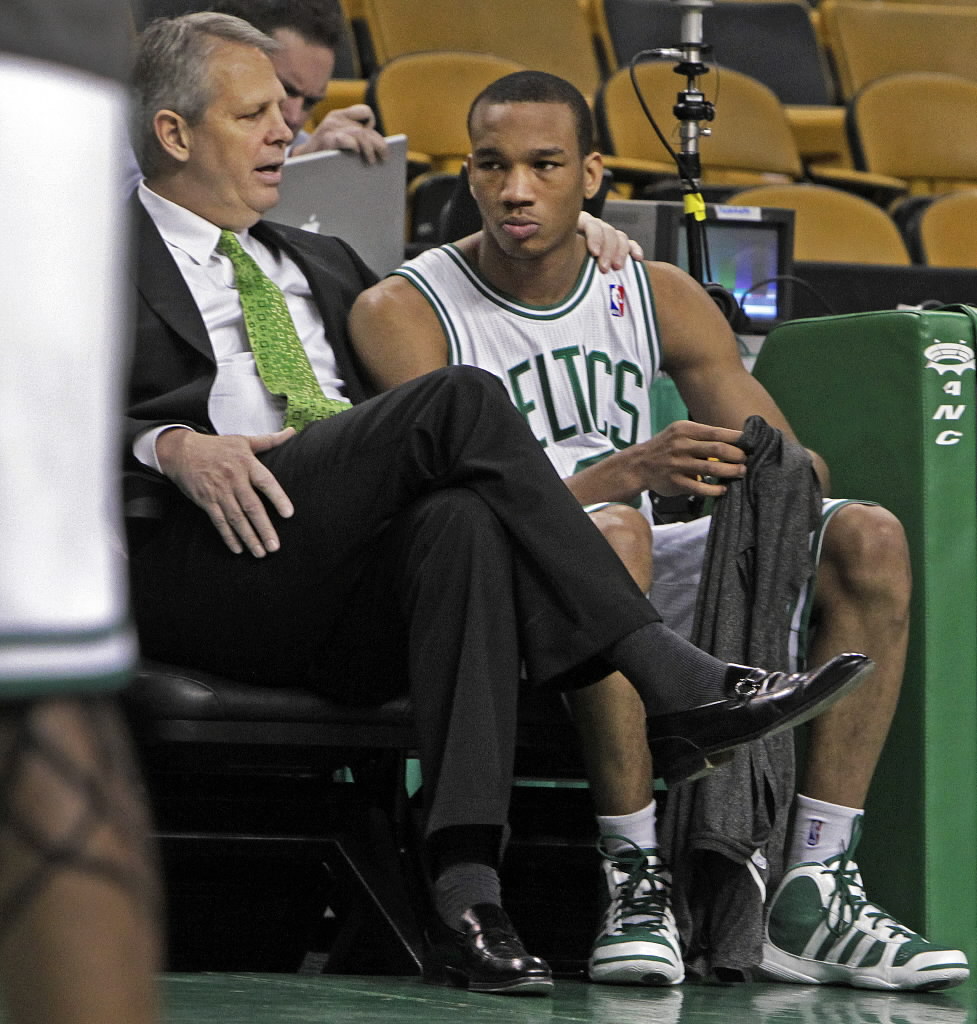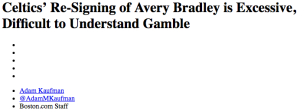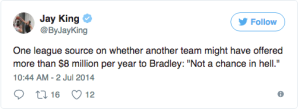This morning, the Celtics completed a trade that sends Avery Bradley to the Pistons for Marcus Morris. It’s quite the bitter pill to swallow. A beloved Celtic, Bradley played seven seasons in Boston and was the longest tenured player on the roster.
He was once a timid guard who could barely handle the ball beyond half-court, and he struggled to make any shot that wasn’t an open 15-footer. He developed into the NBA’s best on-ball defender, one of the better two-way guards, and a selfless teammate who garners respect from everyone in the league.
It seems like forever ago, but Bradley was drafted in 2010, a few weeks after the Celtics lost to the Lakers in the finals. At that point, the roster was in flux. Doc Rivers was considering leaving the team to spend more time with family. Paul Pierce and Ray Allen were unrestricted free agents. The pain of losing game seven of the finals was compounded by the uncertainty surrounding the roster.
Danny Ainge selected Avery Bradley with the 19th overall selection — a pick several media members thought Ainge should have traded for veteran help during the season. Bradley was once the top player in the nation, ranked ahead of John Wall and Derrick Favors, but he wasn’t coming into an ideal situation for a rookie.
The C’s decided to retool, not rebuild, and Avery joined a team with some of the biggest egos in NBA history, including Garnett, Pierce, Allen, Rondo, Shaquille O’Neal, and Jermaine O’Neal. All that bloated confidence in a locker room would break most rookies. Bradley only played 162 minutes that year, but immediately earned respect from his veteran teammates for his day-to-day work ethic.
Here’s a clip from ESPN’s The Association. Bradley got they typical rookie treatment (starts at 3:35):
During the 2011-2012 lockout shortened season, Boston got rid of Delonte West so Bradley could get more opportunity in the rotation. He looked terrible early in the season, struggling with his ball-handling, playing out of position at point guard, and lacking confidence offensively. Some fans were thinking, “how was this guy the top high school player if he can’t shoot or dribble?”
He got his first start on January 20th in a loss to Phoenix. The Celtics were 5-8, the roster was old, and Bob Ryan infamously declared “we’re in year 5 of the 3-year plan.” But in Bradley’s first start, he scored 10 points and nabbed three steals. Celtics fans saw what a defensive menace he could be. Amidst a Ray Allen injury, he started the next seven games, and the team went 6-1.
Over the next few months, Doc Rivers would unleash Bradley’s defensive potential. Bradley would hound guards the full 94-foot length of the court. He was incredibly aggressive and opposing guards feared dribbling the ball in his general vicinity.
It was a true fucking revelation. This seemingly old, decrepit team was ignited by the 20 year old Bradley. There was no precedent for this, no NBA equivalent to what Bradley was doing defensively. The closest comparison was to NFL shut-down cornerback Darrelle Revis, and “Avery Island” was actually becoming a thing.
When Bradley re-entered the starting lineup on March 25th, the Celtics ripped off 5 straight wins, including a 19 point blowout to the eventual champion Miami Heat. Who could forget this insane block on Dwyane Wade:
A few days later, Doc was convinced Avery Bradley was best suited as the starting shooting guard, and Ray Allen should come off the bench. He started through the playoffs but got injured during the conference semi-finals against Philadelphia. The C’s lost to Miami in a seven game battle the next series, but many believed if Avery was healthy, they could have pulled off the upset.
Injuries became a trend for Bradley. His constant defensive aggressiveness came at a cost. He was undersized, still offensively challenged, and as a restricted free agent on the 25-57 team from 2013-2014, the NBA world was baffled when Ainge gave him a 4 year/$32 million deal.
Dig into twitter, and you’ll find some incredible “freezing cold takes” on that contract. Here’s a sample from CBS Sports writer Adam Kauffman.
He wrote this before the contract was signed:
And this was his headline after Bradley agreed to the deal:
Bradley vindicated himself by playing a career high 77 games during the 2014-2015 season, and the Celtics made the playoffs. It immediately looked like a great contract, and several executives offered first round picks at the trade deadline and offseason. It was a big time about-face from league execs.
Over the next three seasons, the Celtics went from Eastern Conference bottom dwellers to a 53-win top seed. Each year, he added something to his game. In 2014-2015, he got better at moving off the ball, hitting one-dribble pull-ups, and picking his spots defensively. In 2015-2016, Bradley expanded his range and became a reliable three point shooter, all while making 1st team all-defense and finishing third in defensive player of the year voting.
Last season, when we thought he may have plateaued, Bradley still found ways to improve. He developed the ability to initiate offense as a lead ball handler, hit contested threes, attack close-outs, and finish in the paint. He averaged 6.1 rebounds per game, one of the best rebounding seasons for a player 6’2″ or under.
Earlier in his career, Bradley had only one gear on defense — reckless aggressiveness at all times. He now sports himself as a high IQ defender who understands the balance between going for steals and holding position. When he was left off the all-defensive teams this year, several opposing players, including Damian Lillard, Jared Dudley, Devin Booker, and CJ McCollum, voiced their displeasure on his omission.
While Bradley always improved on the court, what’s most impressive is the leadership and charisma he displayed during the Celtics-Bulls first round series. Chyna Thomas, the sister of our fearless leader and MVP, tragically passed away. Understandably, Isaiah didn’t speak to the media, and Avery Bradley assumed the role of team spokesman.
The Celtics were down 0-2. The whole organization was devastated by the news. Avery Bradley played a leading role behind closed doors and when speaking to media. He spoke about his special bond with Isaiah Thomas and his family. When asked about basketball, he remained positive and handled the tough situation with immense class. Bradley truly held the team together, and they were able to win four straight and advance to the second round.
Now, let’s talk about this morning’s trade. The salary cap was originally projected to be $105 million. Then teams expected a lower $101 million cap, but it shrank even further to $99 million. That royally screwed the Celtics, and left them $400,000 short of Gordon Hayward’s max-contract demands.
The Celtics had to make a decision to trade either Bradley, Crowder, or Smart. Crowder is locked up on a bargain deal for three more years. Smart is a restricted free agent next summer — the Celtics can match any offer, and he won’t command a salary as high as Bradley’s.
For Avery, he’ll be an unrestricted free agent next summer and will command a salary between $15 and $18 million, maybe more. Otto Porter just received a 4 year/$102 million offer and Tim Hardaway jr. was offered 4 years/$71 million. A $15-18 million annual salary is a generous projection.
We simply cannot afford to keep Bradley, Thomas, and Smart without an unreasonably high tax bill. Losing Bradley in free agency without getting a player in return would be a bad blow to the organization.
Marcus Morris will make $5 million this season and $5.3 million in 2018-2019. It’s an awesome contract for a starting power forward. Morris has the physicality to play in the paint and versatility to defend on the perimeter — he’s a great fit with Al Horford. His rebounding stats aren’t great, but Morris will help the Celtics 1-on-1 scoring issues and prove to be an upgrade from Amir Johnson.
With only Horford and Ante Zizic on the books, the C’s were in dire need of a competent big man. With this trade, they solved the problems of Hayward’s max contract, Bradley leaving in free agency for nothing in return, and the thin front-court rotation.
Let’s be clear, the Pistons got the best player in the deal. For those who think we could have gotten more for Bradley, ask the Pacers how much a 1-year deal with impending free agents diminishes the value of a good player. Stan Van Gundy will love coaching Bradley, and he should have a major role on a Pistons team battling for a playoff spot.
Throughout the Danny Ainge tenure, the Celtics have always let go of good players who aren’t quite all-starts, but are beloved by Bostonians. Kendrick Perkins got traded during the final year of his contract, and Tony Allen wasn’t re-signed. Al Jefferson and Ryan Gomes were shipped to Minnesota in the Garnett deal. We can even go way back to Ainge trading Eric Williams and Tony Battie for Ricky Davis. This situation is no different.
I think I can speak on behalf of Celtics Nation: Thank you, Avery. You were drafted by a contender, endured through a rebuilding effort, and helped bring the Celtics back to Eastern Conference supremacy. You embodied what it meant to be a Boston Celtic, and a Boston pro-athlete in general. You will surely be missed.
When the Pistons come to Boston, Bradley should expect an enthusiastic ovation. The Celtics Video Tribute Department — the best faction of the Celtics organization — is already in pre-production.
Add The Sports Daily to your Google News Feed!



